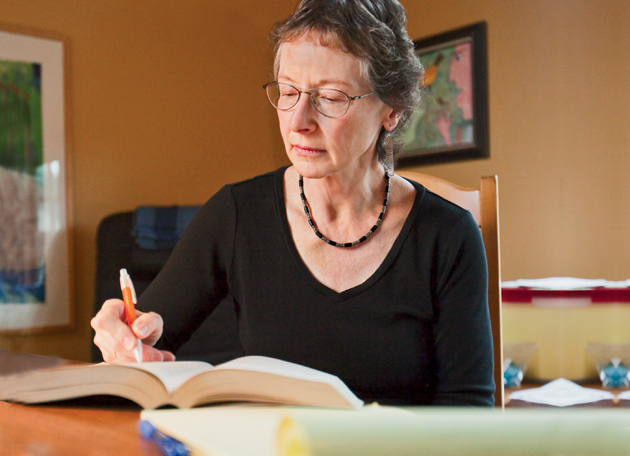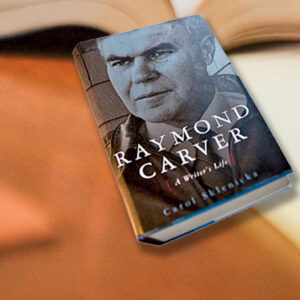
His friends called Raymond Carver a “story-catcher,” and his first full-length biographer, Carol Sklenicka, MA ’78, PhD ’86, has caught a dazzling array of stories, too. To illuminate Carver’s life, she scoured the country for clues to this brilliant but deeply flawed man — possibly the most influential short story writer of the late 20th century — who died at age 50 in 1988.
But her ensuing biography, Raymond Carver: A Writer’s Life, bears no relation to Carver’s spare texts, honed and sometimes heavily altered by his editor, Gordon Lish. Nearly 500 pages long, this book is filled with lavish details about his peripatetic life, his two wives and two children, his toxic drinking spells, his eventual break with alcohol, and his early death from lung cancer. Above all, Sklenicka traces the story of a man who had a single, overwhelming passion: to be a writer.
“Sklenicka’s genius lies in her ability to connect the events of Carver’s turbulent life to the incidents depicted in his stories,” wrote Jacob M. Appel in Ploughshares.
Like her successful subject, she has won acclaim from a range of critics, including Jacob M. Appel, writing for Ploughshares, who called it an “insightful and engaging biography.” Author Stephen King, another escapee from the hellish world of heavy drinking, described it as an “admirable biography.” And The Washington Post, the San Francisco Chronicle and several other publications named this book, issued in paperback late in 2010, as one of the 100 most notable books of 2009. The New York Times Book Review chose it as one of the “10 Best Books of 2009,” and it was nominated for a PEN-USA award.
That’s a heady response for Sklenicka, who was gratified to note that Appel said: “Sklenicka’s genius lies in her ability to connect the events of Carver’s turbulent life to the incidents depicted in his stories.” In one story after another, Carver built upon gritty incidents that had taken place in his own life. It was fascinating, she says, to connect the dots.
“That’s where you find the genius of a writer and editor,” she adds, “when you see which details make the best story.”
A writer’s background
The details of Sklenicka’s own life are far more peaceful than those of her troubled subject. She was raised in Santa Maria, Calif., to parents who had not been able to attend college. They were eager for her to go, however, and she graduated from California State Polytechnic University. “They wanted me to get an education,” she says, “but they were surprised at how long I kept it up.”
After three years of teaching high school English, she moved to Washington University, an experience that changed her life in two ways. First, she met her husband, poet Richard M. Ryan, also a doctoral student in English. And she took courses with faculty — poetry with Howard Nemerov, fiction-writing with Stanley Elkin, Shakespeare with Larry Ross — that would later enrich her own work.
Most influential of all was Naomi Lebowitz, now the Hortense and Tobias Lewin Distinguished Professor Emerita in the Humanities. “She taught these wild comparative literature courses on subjects like ‘James’ Flaubert’ or ‘Dickens’ Balzac’; she had a wonderful time making comparisons. Her energy was so infectious, and she cared very deeply about writers’ lives. To be in a seminar with her felt like being in a conversation with these great writers.”
When Ryan left the program and moved to his native Wisconsin to become a stockbroker, Sklenicka joined him but finished her degree. With Lebowitz’s help, she turned her dissertation into her first book, D.H. Lawrence and the Child, an examination of Lawrence’s insights into the nature of childhood and parenting.
For years, the couple lived in Milwaukee, working and raising their children, Katherine and Robert. Sklenicka taught writing at Marquette University and the Milwaukee Institute of Art & Design and published articles in such journals as Sou’wester and South Atlantic Quarterly. She could scarcely imagine, she says, “working on something that took more than three weeks.”
A writer’s world
Then, on a trip to the Northwest, she decided to visit Yakima, Wash., and that stop rekindled her interest in Carver, whom she had read years before. Born in 1938 in Oregon, he had spent his childhood in this place, where his father was a hard-drinking mill worker. It was in Yakima that Carver had married his first wife, Maryann Burk, just 16 and pregnant. Their life of poverty, menial jobs and drunken abuse began here, too.
In the 1990s, when Sklenicka embarked on her research, Carver acquaintances were still abundant in Yakima, and one contact led to another. Through one lucky referral, she met a family who had lived across the street from the Carvers when Raymond was a boy.
“Three of them had known him, and they kept remembering stories,” she says, “but they were opinionated and would argue with each other. Was Carver’s mother, Ella, an oddball? What was his father like? Certainly, Raymond was sociable, but he was nervous and changed homes a lot.”
Soon Sklenicka’s research took her to other Carver stops: to Northern California, where he had taken a seminal fiction course; to Iowa City, where he attended the Iowa Writer’s Workshop; to Syracuse, N.Y., where he taught much later, after summoning the strength to quit drinking and forming a household with the poet Tess Gallagher. In a small town near Syracuse, she tracked down poet Hayden Carruth, a Syracuse colleague of Carver’s, not long before his death.
“Carver liked to say he had two lives, and sometimes he spoke of two people, ‘Bad Ray’ and ‘Good Ray.’ …Of course, he was one man with one life,” Sklenicka says. “Bad Ray and Good Ray together were messier and more human than his dichotomy supposed.”
“Carruth was an older man with a wild beard, on an oxygen tank,” she says. “He was totally focused on literature and had bookshelves up to the rafters. To hear of his respect for Carver was moving, especially since he was more educated and, in some ways, a more serious poet and literary critic.”
After 10 years of work, she wove such tales into a narrative and brought Carver’s tumultuous story to light. As she says in her introduction: “Carver liked to say he had two lives, and sometimes he spoke of two people, ‘Bad Ray’ and ‘Good Ray.’ …Of course, he was one man with one life. Bad Ray and Good Ray together were messier and more human than his dichotomy supposed.”
Since 2005, Sklenicka has lived in Northern California with her now-retired husband, who just published a new volume of poetry, Vaudeville in the Dark. Sklenicka herself is beginning another project: Scribner, publisher of the Carver book, has commissioned a biography of short story writer Alice Adams.
Her days follow a gentle routine. In the mornings, she begins writing and continues through lunch, “since I’m a slow writer and mornings aren’t long enough,” she says. When she isn’t traveling for research, she likes to spend her late afternoons outdoors: hiking in the hills, going to the beach with her dog, gardening, or kayaking.
In the end, what did she think of Carver? “I was happy for him that he was able to pull his life together and attain some success,” she says. “One day, my husband and I sat reading his late poems aloud, and we were both crying. I like him for stepping up during his final illness and having the courage to write about it.”
For more information, visit http://authors.simonandschuster.com/Carol-Sklenicka/22608856.
Candace O’Connor is an award-winning freelance writer based in St. Louis.


Comments and respectful dialogue are encouraged, but content will be moderated. Please, no personal attacks, obscenity or profanity, selling of commercial products, or endorsements of political candidates or positions. We reserve the right to remove any inappropriate comments. We also cannot address individual medical concerns or provide medical advice in this forum.